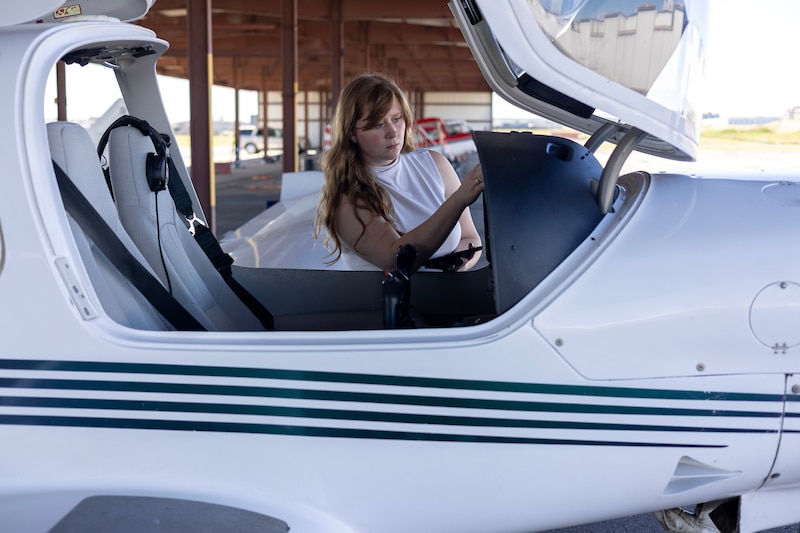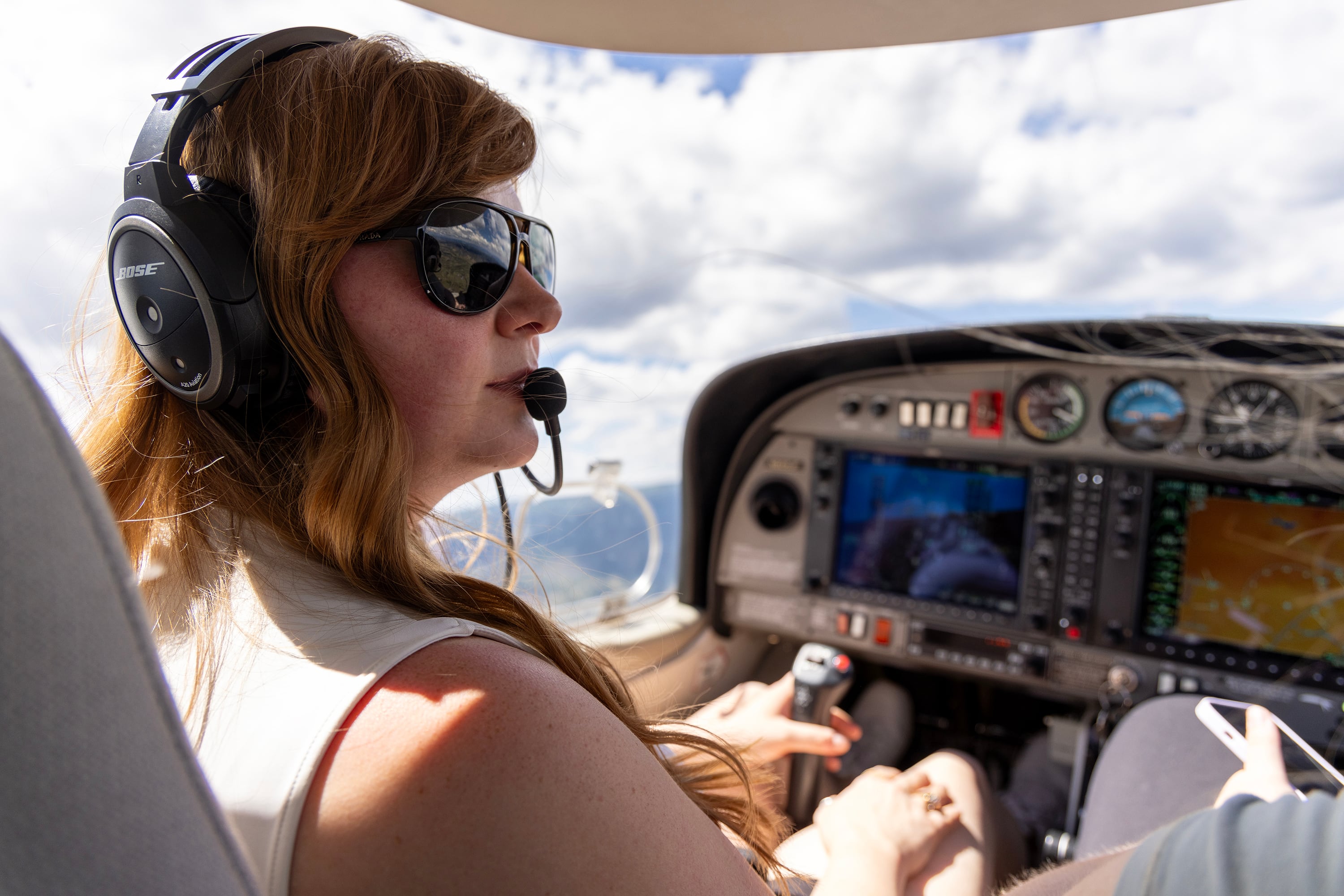Dagmar Kress dreamed of becoming a pilot. But her father told her that flying wasn’t something women did.
She recalled him saying at the time, about 55 years ago: “Oh, that’s not for women, that’s too technical and you could never have a family,”
But Kress didn’t heed her father’s warnings and went on to become a decorated pilot and flight instructor. She is also a lecturer at Metropolitan State University of Denver, where she is helping guide other women into the aviation field.
MSU Denver is considered one of the most comprehensive aviation schools in Colorado, offering extensive courses in its aviation and aerospace department where students can earn degrees and certifications including professional flight officer, air traffic controller, aviation management, and drone operator.
The program is also notable for its enrollment of students who identify as female, which at 20% sits above the industry standard. The number of women enrolling in MSU Denver’s program has increased almost each year since 2017, when the university started tracking data.
Nationally, women made up fewer than 16% of students enrolled in aviation programs in 2022, according to data from the Federal Aviation Administration.
MSU Denver’s success in attracting women to the aviation program is coming at a key time for the industry, which is being hit by an unprecedented rate of mandatory retirement. That will leave openings for women to break through a field that has been historically male-dominated. About 91% of aircraft pilots and 75% of air traffic controllers are male, according to the federal Bureau of Labor Statistics.
University President Janine Davidson, herself a former pilot, frequently promotes the aviation program. In addition, several of the aviation faculty are women, and the university actively works to connect students with job opportunities — most recently through a new partnership with United Airlines.
The university’s Women in Aviation chapter also works to help younger women pilots see that they have a place in aviation, as well as providing scholarships, networking, and opportunities for travel that might otherwise be out of reach.
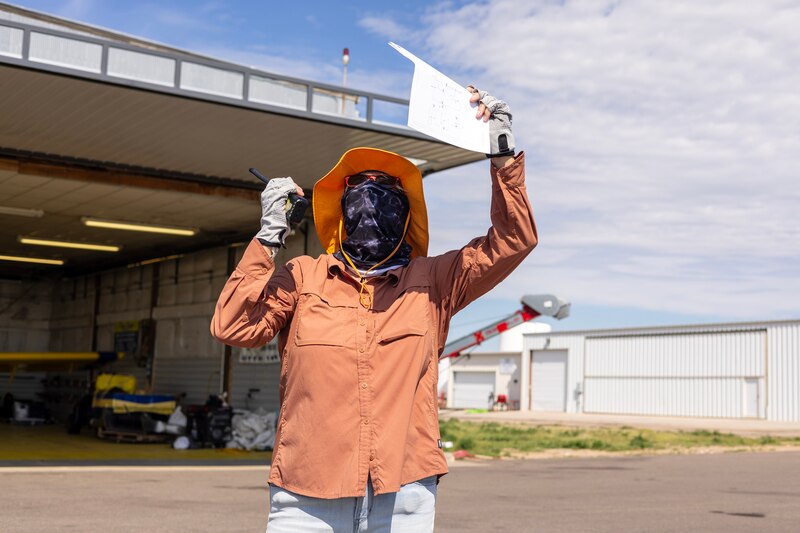
Kress, 64, understands firsthand the challenges that women can face in pursuing a career in aviation, noting that when she was starting out “women were expected to be a housewife, take care of kids, and were discouraged from careers.”
Kress immigrated to the U.S. from Germany when she was 24 and earned her master’s degree in business administration, but fell in love with aviation while studying in Albuquerque, New Mexico.
Many of Kress’ first influences in the industry were women and she credits “everything she knows and has learned” to Charlee Galbreath, a former Navy pilot and the woman who taught her how to fly in 1985.
Kress has now been teaching others how to fly for over 33 years as a flight instructor and has been at MSU Denver for the past eight years. She also serves as the head coach for the university’s aerobatic team, which she has led to 13 collegiate championships.
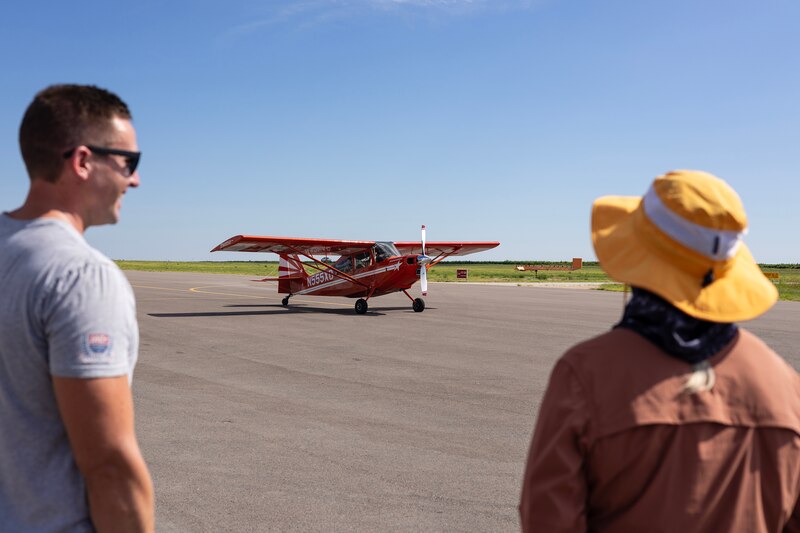
“If the men can do it, so can the women, maybe even better,” said Kress, an international world aerobatic competitor who has competed in world championships for Germany.
This fall, when she looked at her class rosters, Kress said she saw more women enrolled compared to previous years. More years than not, Kress has often seen more men enrolled in her course. This year, she has a class that is half women.
Aerospace industry, military feed aviation pipeline
The aviation major at MSU Denver dates back to 1967 and was one of the original major programs offered at the school, which first opened in 1965 as Metropolitan State College.
That was fitting for a place like Colorado, which has become a hub for the aviation and aerospace industry with companies and government agencies such as Lockheed Martin, Boeing Corporation, the United States Space Command, the North American Aerospace Defense Command, known as NORAD, and the Air Force Academy, all based in Colorado Springs.
Denver International Airport — the largest airport in North America — and Lockheed Martin are part of Colorado’s top employers with over a combined 40,000 workers. Both have recruited possible applicants from the university’s programs.
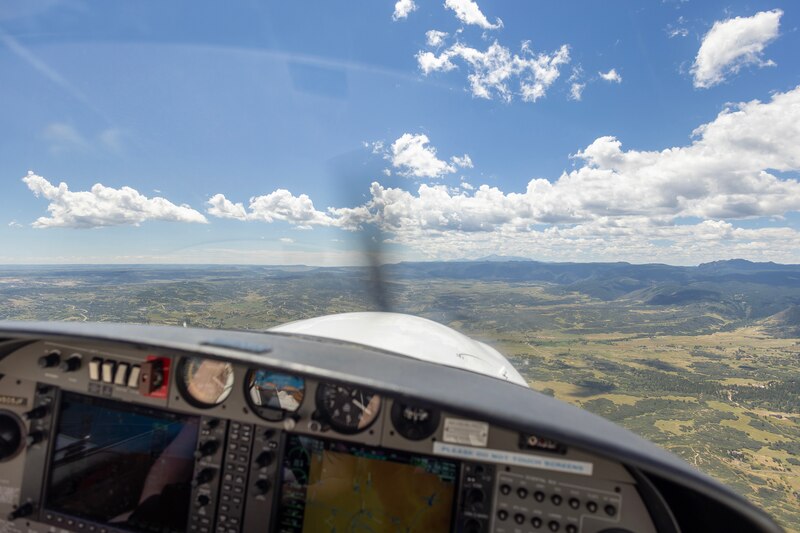
The military is also a critical pipeline for aviation careers – as well as the root of an early barrier for women.
Former military pilots have historically represented the largest percentage of airline pilots’ backgrounds. In the 1980s, roughly two-thirds of all airline pilots in the United States had some form of military experience. It’s now estimated that one-third of airline pilots have military aircraft experience, partially due to many retirements.
But it wasn’t until 1993 that the United States Armed Forces lifted the Combat Exclusion Policy, a 45-year-old practice prohibiting women from serving in combat roles. The change only pertained to aviation positions and allowed women to serve in almost any aviation role. (The limits on women in other military roles were lifted in 2013.)
Once that legal hurdle was lifted, doors previously closed for women were opened, increasing aviation opportunities in the military.
Many second-generation aviators, such as Laura Braunshmidt, a lecturer at MSU Denver, have roots in the military. Her father, like many others in the industry, served in the U.S. Air Force.
Braunshmidt was surrounded by aviation her whole life. Her father served as a radar engineer, her husband is a pilot, and her father-in-law built airplanes. Even her son became an air traffic controller.
“I always was fascinated by aviation but never really thought it was something I could do,” Braunshmidt said.
Braunshmidt began thinking about a career in aviation for herself about 15 to 20 years ago and became a professional pilot for a few charter airlines while working in Michigan and Wisconsin. She eventually grew tired of the constant travel and took a position teaching at MSU Denver, eventually advising the Women in Aviation chapter.
Being able to teach and see women grow in the field has been one of the highlights of her career, she said.
“All of the things that men have been enjoying for a long time now, women are able to enjoy them now in aviation, too,” Braunshmidt said.
Costs and industry culture create barriers for women
But barriers still exist in aviation for women and people of color.
Women are more likely than men to consider leaving the aviation industry, because of negative experiences in a culture often not welcoming for women. Current efforts to promote diversity and inclusion in aviation are often ineffective, with men deciding what initiatives will enhance gender and diversity balance, according to a 2021 report by the International Aviation Womens Association.
Another hurdle is cost. It can cost as much as $75,000 to $100,000 for the training and education needed to become a pilot.
To earn certain pilot ratings, pilots must fly a minimum of hours, all of which accumulate costs for renting a plane, hiring a flight instructor, and paying for gas. Many of those who pursue the industry come out of their education with significant debt.
MSU Denver students Holly Hunsaker and Shelly Hughes know that all too well. Both are first-generation pilots who compete on the university’s aerobatic team and are on their way to becoming professional flight officers.
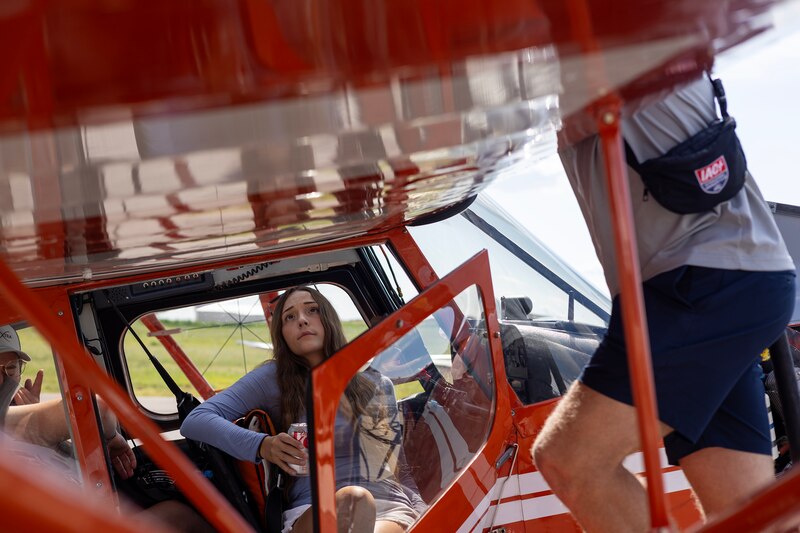
They are also both scholarship recipients. All of the funds have either gone to required flying hours, classes, or costs related to practicing aerobatics at the team’s practices.
“I would say that money is the number one challenge, especially as a first-generation pilot because my family doesn’t really understand how expensive it is,” Hughes said. “Having to find my own funds to pay for it has been the hardest part and it’s the reason why I don’t have my license fully done yet.”
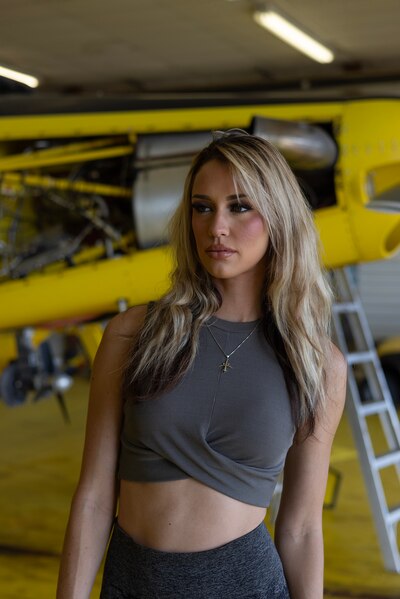
Hunsaker received a $2,500 aerobatic scholarship through the university’s Women in Aviation chapter, which was donated by Kress, the aerobatics coach.
“We are the future,” Hunsaker said about women in the industry.
Women in Aviation chapter creates support system
Natalie Gramer, a senior this fall at MSU Denver, has played an integral role in bringing together women from the program. In 2019, Gramer co-founded the university’s Women in Aviation chapter, the first of its kind on campus.
When Gramer first started her classes, she was told that she would see few women in the aviation field. That’s exactly what she encountered when she started in the industry.
“It was very apparent to me that I was in a world where I felt like I belonged, but I didn’t really know how I fit in,” Gramer said, explaining why she helped co-found the chapter.
Gramer felt like it was her calling to help create a non-exclusionary space where others could feel like they belonged, were supported, and could give back. The chapter started with a handful of people and has now grown to over 70 members.
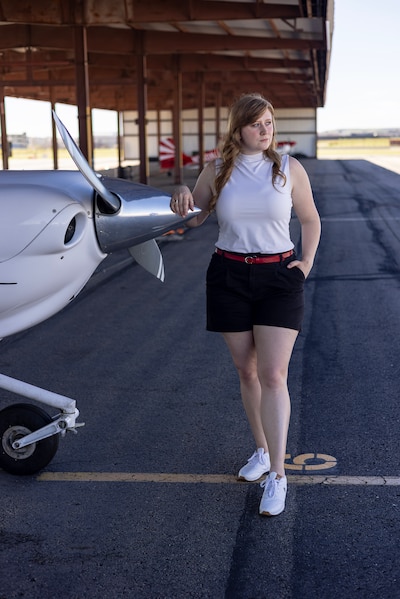
But Gramer was no stranger to aviation. Her father is an alum of the university’s aviation program, served as a pilot in the Air Force, and was a Delta Air Lines pilot for 40 years before recently retiring. Her godfather was also a pilot.
Seeing women in the same place as herself had a big impact on Gramer.
“It changed my perspective on my education,” Gramer said.
Gramer, who has served as the Women in Aviation president for the past two years, said it has been the pride and joy of her college experience.
Over the past three years, the university has paid for the chapter to travel to the Women in Aviation International conference, where chapter members have been able to connect with women involved in aviation from around the world. The conference encourages the advancement of women in all aviation career fields and interests.
“The power that we can give to other people by sharing our passions and just being kind embodies what Women in Aviation is,” Gramer said.
Gramer has now passed on the mantle of president of the chapter as she prepares for graduation in December. Her goal is to start teaching others how to fly and is in talks with the university to return as an instructor.
Sara Martin is an intern with Chalkbeat Colorado. Contact Sara at smartin@chalkbeat.org.
